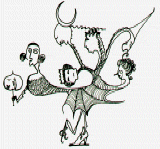|
Antique Rosewood box of Architectural form inlaid with
brass Circa 1820
Please click on images to enlarge | thumbnail index |
high resolution
|
Description:
Ref: 724JB http://hygra.com/box/724JB
Antique Box of impressive architectural form veneered in rosewood and decorated with bold stylised floral inlays in
brass. The inlays follow the contours of the shape of the box, emphasising its inspiration which derives from ancient monuments. It stands on turned feet and it is edged in gadrooning. Circa 1815-20
The shape is inspired by the second phase of ancient discoveries, which brought the monuments of Egypt and the rest of the middle east to
the attention of the erudite. The sides lean inwards and this is further emphasised by
the inlay pattern which is narrower on the top. This suggests looking up at a temple
and seeing its top at a distance and therefore shrinking. The lid is formed at an
angle with the box suggesting the roof. The sides are in gently sloping pyramid shape
concluding in a plateau. The whole piece pays tribute to ancient architectural
construction. The feet help the appreciation of the form by giving its base a lift.
Origin: UK ; Circa:
1820; Materials: .
Size: 32cm wide by 24cm by 14 cm: 12.6 inches wide
by 9.5 inches by 5.5 inches.
Condition: good
overall; working lock and key; see images
Request
current list of available sewing boxes with prices.
Request
current list of available writing boxes with prices.
Request
current list of available jewelry boxes with prices.
Request
current list of available tea caddies with prices.
boxes@hygra.com
|
 (Small).JPG)
|

 (Small).JPG)
|
The box opens to a later lift-out tray lined in cotton velvet. The inside of the lid is also
covered in cotton velvet. The finely gold embossed leather frame is original and
characteristic of the high quality of such work done in the early part of the 19th
century.
|
Please click on images to enlarge | slide show | thumbnail index |
 (Small).JPG)
|
Detail of the exquisite embossing. The pattern of stylised acanthus gathered and
resolving in a pattern is extraordinary and could have only been designed in that most
eccentrically innovative period-The Regency.
|
The box opened in side view showing the complexity of its contours.
|
 (Small).JPG)
|
Please click on images to enlarge | slide show | thumbnail index |
Front view showing how the feet lift the whole box, showing its full architectural
credentials. The turned handles snuggle unobtrusively in line with the two most
outward points in the structure.
|
 (Small).JPG)
|
 (Small).JPG)
|
Detail of the brass inlay. The flora of abstracted palmette and acanthus leaves is in
the neoclassical tradition. Such brass work was fashionable in the early part of the
19th century. George Bullock, who made furniture for the Prince Regent (later George
IV) was an exponent of this style and also an innovator. He designed his flora in a
less rigid way, so it curved and undulated with a hint of naturalism, as it is here.
|
Please click on images to enlarge | slide show | thumbnail index |
 (Small).JPG)
|
Detail of the top which shows the robust gadrooning which both finishes the edges and
makes the whole appear more weighty.
|
Please click on images to enlarge | slide show | thumbnail index |
 (Small).JPG)
|
There are turned rosewood
handles to the sides.
|
The top is a symphony of undulating flora on the side and a central pattern. All
executed with incredible control and accuracy, without sacrificing the suggestion of
growing flora.
The centre panel of the top is framed with gadrooning as is the
pediment adding the architectural impact
|
 (Small).JPG)
|
The very top. The central plaque is framed by a symmetrical pattern of inlay in
harmony with the rest of the inlay.
|
 (Small).JPG)
|
Please click on images to enlarge | slide show | thumbnail index |
 (Small).JPG)
|
Bottom showing the feet, the facings and the original paper.
|
 (Small).JPG)
|
The gold embossed leather is original. |
Please click on images to enlarge | slide show | thumbnail index |
The lid is lined with velvet framed with gold embossed leather
|
 (Small).JPG)
|
Please click on images to enlarge | slide show | thumbnail index |
All text and images and linked images are ©
1999-2014 Antigone Clarke and Joseph O'Kelly. If you require any further
information on permitted use, or a licence to republish any material, email us
at copyright@hygra.com
| 